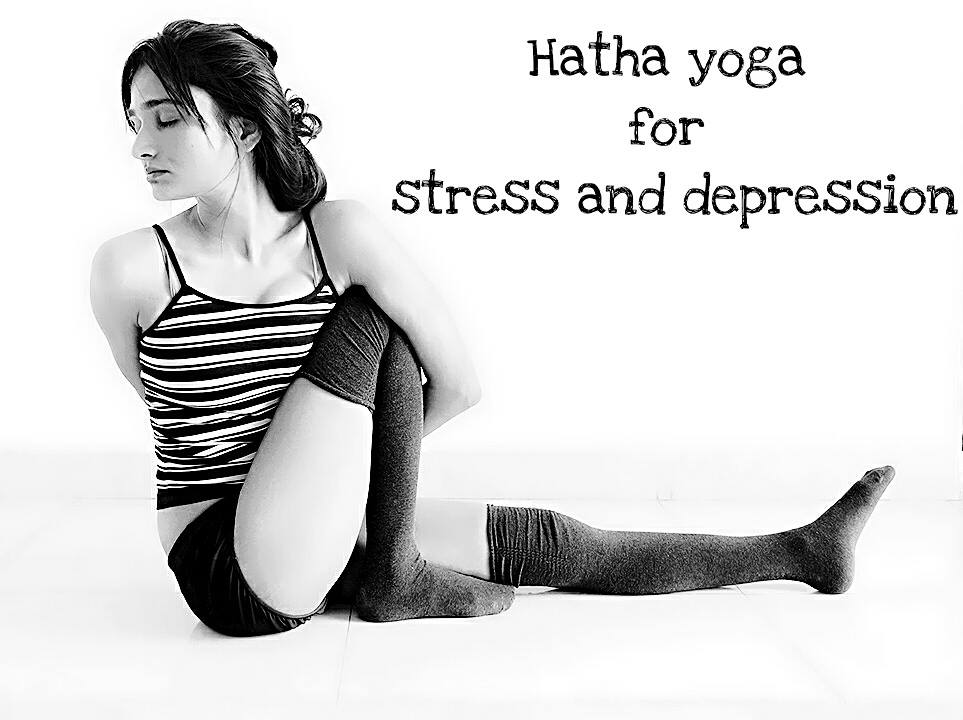Hatha yoga effective for anxiety and depression
Category : Yoga
 What does hatha yoga class involves?
What does hatha yoga class involves?
Hatha yoga practice involves combination of postures (asanas), purification techniques (shatkriya), gestures (mudras), breathing (pranayama), and meditation.
Scientific research proving effectiveness of Hatha yoga for anxiety and depression
Rapid stress and anxiety reduction within three month hatha yoga program
A controlled study conducted in 24 women with emotional and mental distress. Subjects were offered participation in 3-months yoga programs. After 3 months significant improvements shown on stress and psychological outcomes. Significant improvements in perceived stress, State and Trait Anxiety, well-being, vigor, fatigue and depression. Physical well-being also increased, and those subjects suffering from headache or back pain reported marked pain relief. {source}
Hatha yoga effective practice to reduce anxiety before and after practice
The search identified 17 studies (11 waitlist controlled trials) totaling 501 participants who received Hatha yoga and who reported their levels of anxiety before and after the practice. Study result shows hatha yoga treatment efficacy was positively associated with the total number of hours practiced. People with elevated levels of anxiety benefited the most. {source}
Prenatal yoga reduces symptoms of depression and anxiety
Prenatal yoga was found to be a feasible and acceptable intervention and was associated with reductions in symptoms of anxiety and depression.
A study conducted on 46 pregnant women with symptoms of depression and anxiety to an 8-week yoga intervention or treatment-as-usual (TAU). Yoga was associated with high levels of credibility and satisfaction as an intervention for depression and anxiety during pregnancy. Participants in both conditions reported significant improvement in symptoms of depression and anxiety over time; and yoga was associated with significantly greater reduction in negative affect as compared to TAU. {source}
Yoga and meditation based relaxation boost mood, reduces anxiety and improve memory
Yoga and meditation can alleviate stress, anxiety, mood disturbance, and musculoskeletal problems, and can enhance cognitive and physical performance.
A controlled study evaluated the benefits of yoga and meditation for musicians. A group of 15 Young adult professional musicians each who volunteered to participate in a 2-month program of yoga and meditation were randomized to a yoga lifestyle intervention group or to a group of practicing yoga and meditation only. Additional 15 musicians were recruited to a no-practice control group. Both yoga groups attended three Yoga or meditation classes each week. The yoga lifestyle group also experienced weekly group practice and discussion sessions as part of their more immersive treatment.
Both yoga groups showed a trend towards less music performance anxiety and significantly less general anxiety/tension, depression, and anger at end-program relative to controls. Results shows that yoga and meditation techniques yoga and meditation techniques themselves may have mediated the improvements, can reduce performance anxiety and mood disturbance in young professional musicians. {source}
Immediate anxiety relief and improved memory after a cyclical combination of yoga postures and meditation class
A yoga practice involving cycles of yoga postures and supine rest (called cyclic meditation) was previously shown to improve performance in attention tasks more than relaxation in the corpse posture (shavasana).
A study of fifty-seven male volunteers the immediate effect of two yoga relaxation techniques was studied on memory and state anxiety. All participants were assessed before and after (i) Cyclic meditation (CM) practiced for 22:30 minutes on one day and (ii) an equal duration of Supine rest (SR) or the corpse posture (shavasana), on another day.
Study result shows significant improvement in the scores of all sections of the Wechsler memory scale (WMS) studied after both CM and SR, but, the magnitude of change was more after CM compared to after SR. The state anxiety scores decreased after both CM and SR, with a greater magnitude of decrease after CM. {source}
Yoga may facilitate neuroplasticity through stress reduction in depressed patients
Depression is associated with low serum Brain Derived Neurotrophic Factor (BDNF) and elevated levels of serum cortisol. Yoga practices have been associated with antidepressant effects, increase in serum BDNF, and reduction in serum cortisol.
Study examined the association between serum BDNF and cortisol levels in drug-naïve patients with depression treated with antidepressants, yoga therapy, and both.
Study results shows significant improvement in depression scores and serum BDNF levels, and reduction in serum cortisol in the yoga groups. In conclusion, yoga may facilitate neuroplasticity through stress reduction in depressed patients. {source}
Conclusion
Hatha yoga is a promising prevention and treatment of stress-related disease like anxiety, depression and improve memory.
Do you practice yoga and mediation for stress management? Which yoga poses and meditation do you prefer ? Share your thoughts in the comments below!

